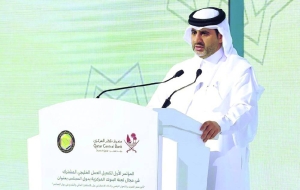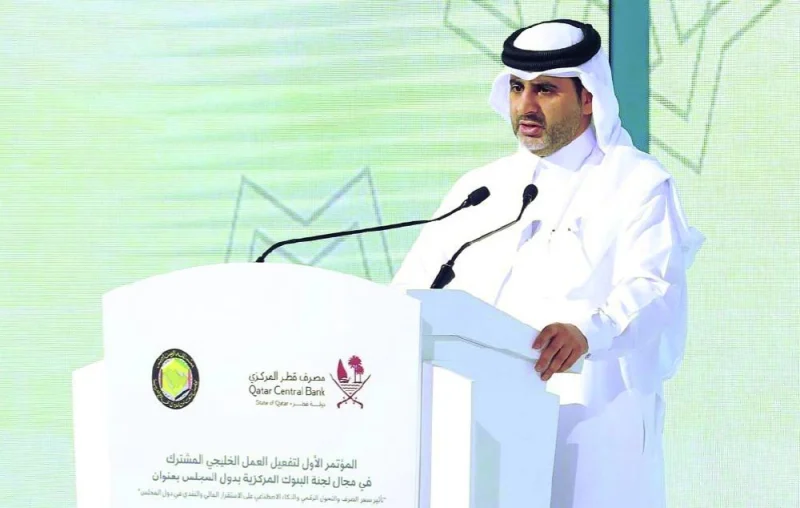GCC fixed exchange rate policy leads to financial and monetary stability, says Sheikh Bandar


HE the Qatar Central Bank Governor, Sheikh Bandar bin Mohammed bin Saoud al-Thani presiding over the meeting of GCC Central Bank Governors entitled ‘The impact of exchange rate policy, digital transformation and artificial intelligence on financial and monetary stability in the GCC countries’.
He was presiding over a meeting of GCC Central Bank Governors entitled ‘“The impact of exchange rate policy, digital transformation and artificial intelligence on financial and monetary stability in the GCC countries’.
Sheikh Bandar noted that each country has adopted a specific policy vis-a-vis its national currency, as it forms the basis of each country’s economy. Therefore, each country has its own economic nature that determines the adopted exchange rate policy.
Most GCC countries have adopted a fixed exchange rate policy, which has proven successful, as reflected in the benefits achieved, as it has led to financial and monetary stability.
“Following this policy has attracted foreign capital, preserved local capital, and mitigated the severity of fluctuations in the prices of imported materials and inflation, in addition to reducing the cost of major projects,” Sheikh Bandar noted.
He stressed that in view of the many benefits achieved thanks to the current exchange rate policy, and comparing them to the challenges represented by the lack of independence of monetary policy, it was seen that the benefits were much greater than the challenges.
The economies of the region need to transfer knowledge regarding construction and technology, he said.
All of these matters require policies that contribute to enhancing financial and monetary stability, and attracting capital to the countries of the region.
The current exchange rate policy has contributed to attracting investments and achieving economic diversification, as fixing the exchange rate has limited currency fluctuations and the associated risks.
He explained that adopting a specific exchange rate policy comes after an in-depth study of the economic structure of countries and their infrastructure, with an assessment of the benefits that this policy will reap.
Therefore, he said that after reviewing all this data, it became clear that the fixed exchange rate policy is the “most successful” for the GCC countries.
Adopting another exchange rate policy, he said, requires a change in the economic structure, which takes years, if not decades and does not happen overnight.
He noted that the International Monetary Fund has praised the success of the current exchange rate policy being pursued by some GCC countries.
He also touched on the success of the GCC countries in maintaining moderate inflation, and that the countries of the world witnessed an increase in inflation over the past two years, reaching 9% and 10% in some cases.
Whereas, in the GCC countries it was at the level of 5% and 6%, which pointed to the effectiveness of the monetary policy followed in reducing inflation levels.
The meeting was also attended by Ayman bin Mohammed al-Sayari, Governor, Saudi Central Bank; Tahir bin Salem al-Amri, CEO, Central Bank of Oman; and Khalid Ibrahim Humaidan, Governor, Central Bank of Bahrain.







